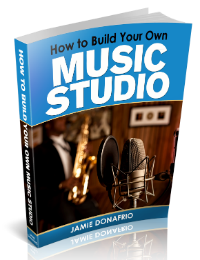Audio engineering schools come in all shapes and sizes, and the most highly touted audio engineering schools will offer quality degrees that can be earned within a 2 to 3-year period. While smaller schools tend to offer a more holistic, interpersonal approach to learning that’s limited to smaller groups.
Online vs On-Campus Training
Online schools or programs can offer dedicated training to students.
However, by and large, most people will agree that nothing really compares to actually being in a real professional studio in person and actually getting to see how the professionals carry out the recording process from start to finish!
Find a School Near You

Click your state in the image above
Several Quality Audio Schools
There are too many audio engineering schools for me to cover in just one article. So, I’ll offer my thoughts on two audio engineering schools that I feel are prime examples of both a full-scale commercial enterprise that, while being highly lauded and successful in its own right, may not always live up to its perceived expectations, and a smaller-scale, down-to-earth, yet highly professional and tightly run operation that will allow you to truly get up close and personal to the real deal and get a taste of what real audio engineering professionals experience on a daily basis.
In this article, I’ll cover the basic history of each school, what you can expect to learn, how much you can expect to pay, and whether I think it’d be worth it in the long run.
Popular Audio Engineering Schools

Full Sail University
When it was originally founded in Dayton Ohio in 1979, Full Sail started off as an audio engineering school that focused mainly on audio engineering and music production as the original curriculum, which quickly expanded into other fields such as video and film production and other related fields in the media and entertainment business after it was relocated a year later to Florida in 1980.
It is a nationally accredited university under the Accrediting Commission of Career Schools and Colleges, and thus is fully capable of issuing associate’s, bachelor’s, and master’s degrees in audio, film, computer animation, business, game design, and other various specialities via over 35 different degree programs.
More Than Just Music
 Honestly, even though this started off as an audio engineering school, there’s no denying that attending this school could basically take you in just about any direction you could imagine in the entertainment industry, which is definitely a strong recommendation as any that you would receive from attending other audio engineering schools that aren’t as likely to be as vast or as comprehensive.
Honestly, even though this started off as an audio engineering school, there’s no denying that attending this school could basically take you in just about any direction you could imagine in the entertainment industry, which is definitely a strong recommendation as any that you would receive from attending other audio engineering schools that aren’t as likely to be as vast or as comprehensive.
Its accolades as one of the premiere and top-notch entertainment schools in the country are far-reaching and have come from a wide array of publications ranging from gaming magazines such as Tips & Tricks and Electronic Gaming Monthly to top pop culture and media publications such as Shift, UNleashed, and Rolling Stones. Its student population consists of around 16,000 to 17,000 students at any one time, and tuition costs will vary between $30,000 to over $80,000 depending on the degree program you choose.
So the question you’re probably dying to know as an aspiring audio engineer is, is it worth it?
Okay, here’s a forum rant containing some (not-so-pleasant comments) that I’ve heard about Full Sail, and another (set of comments) that claim that it can be a worthwhile experience if you’re really and seriously ready to commit yourself 100% to the programs that they have to offer.
My honest advice is to find someone who’s actually gone to school there (either online or in person) and ask them what it was like! If you decide to go for it, don’t expect to land yourself a job immediately following graduation unless you’re willing to network and get yourself out there as much as possible.
What About Do-It-Yourself Guides?
More than likely, if you’re self-disciplined, reasonably intelligent, and know how to follow through on your own and get down to business, you can probably teach yourself everything you need to know about audio engineering via the several DIY guides and blogs (like this one, which I highly recommend!) out there that cover almost every single aspect imaginable of audio engineering from A to Z.
Alternatively, there are also plenty of small-scale audio engineering schools that won’t nearly cost you as much and will be much more willing and able to provide more effective one-on-one instruction without rushing you through the process of learning how to record, mix, and master like a true professional.
Dark Horse Institute:
As far as quality studios located smack dab in the middle of a city - that’s been home to some of this proud nation’s most beloved and world-renowned country, pop, and rock stars such as:
 Johnny Cash
Johnny Cash- Lady Antebellum
- Kings of Leon
- Taylor Swift
Any seriously aspiring audio engineer should take a moment to check out Dark Horse Institute. Since opening its doors in 1994, this low-key yet amply outfitted recording facility has served the likes of Alison Krauss, Jewel, Keith Urban, Megadeth, Michael W. Smith, Tim McGraw, and Neil Diamond.
State of The Art Equipment
Its studios contain custom-modified, state-of-the-art recording configurations that make most other studios look like amateur setups at best, and are neatly situated in rooms that resemble first-class accommodations or suites at a 5-star country lodge, which make for an easygoing and stress-free recording experience that all artists and engineers would die to have.

Good Value for The Money
Not surprisingly, this is the primary reason why Dark Horse Recording (its original name) was founded after all, and as far as tuition is concerned, this is as good as it’s going to get at a mere $9750!
I had to pay more than twice that at the school I went to, and I’ll be the first to say that we didn’t have access to equipment that was anywhere near such a high caliber!
Furthermore, they have fully acknowledged and understand the current debt crisis that most students and aspiring audio engineers are facing today and offer what I believe are arguably some of the most reasonable financing options that you’ll ever find at such a top-notch and highly regarded studio that has recorded and produced some the music industry’s finest musicians and bands to date. Of course, you can probably find other studios that charge less, but given the fact that you’ll be working with instructors who have proven experience and success in the music industry, you really can’t go wrong!
The Two Sides to Music Production Schools
Fundamentally, I believe that most or all audio engineering schools will fall somewhere between the spectrum between a large university like Full Sail and a smaller, more intimate and interpersonal facility such as Dark Horse Institute, and even if you aren’t really thinking about attending either school, you can certainly use these schools as a sort of benchmark to qualify any other school or course that you’re considering as you pursue your education and career in audio engineering.
Develop Yourself as More Than an Audio Engineer
As competitive as the industry has become, I highly recommend that you also develop other skills to augment or supplement your income if your audio engineering career doesn’t really take off from the start, though, it’s also worth mentioning that there are plenty of jobs that you can snatch up at broadcast studios or radio stations if you’re resourceful enough.
All you may be doing is editing audio snippets and whatnot, but everyone has to start somewhere, right?

Learn everything you need to know about building your own music studio. You don't need to be rich to make great sound. We will show you how, for free!
- How to Choose the Right Monitors
- How to find a great Microphone
- Acoustic Treatment Tutorial
- How to Position Your Equipment
